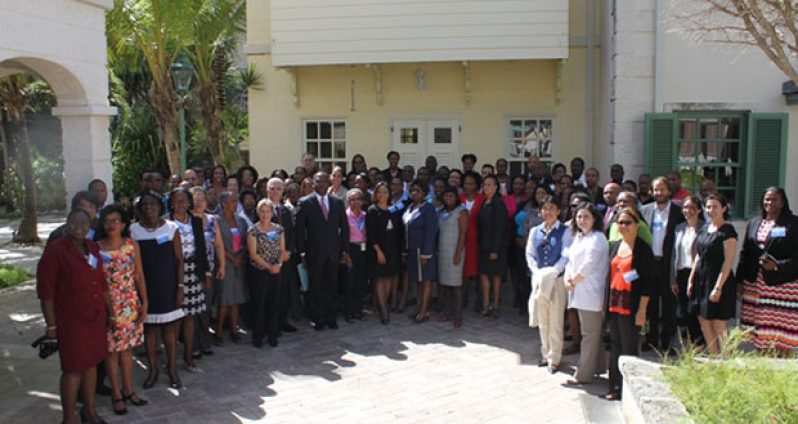Guyana helps regional stakeholders create National Risk Communication Strategy
IN PREPARATION for a possible outbreak of the Ebola Virus, Guyana recently joined some 30 of its regional sister countries in participating in a Pan American Health Organisation (PAHO) workshop aimed at working together on developing a National Risk Communication Strategy.

The three-day caucus, held at the Crane Resort in the Barbadian parish of St. Philips, commenced on November 4, and sought to strengthen national capacity for emergency risk communications in the respective countries along with their bilateral partners.
At the opening ceremony, Barbados’ Minister of Health (Ag), Mr Donville Inniss noted that there is great need for the building of strength in the area of risk communication, as he expressed his gratitude for the initiative and welcomed the participants to the beautiful Island.

The participatory workshop was aimed at threading together knowledge, skills, practice and planning, using adult learning techniques. It focused on current and potential risks to people’s health, such as influenza-like illness/pandemic; dengue haemorrhagic fever, Chikungunya; and Ebola Virus Disease (EVD) in order to strengthen national risk communications capacity, building on efforts made to establish and maintain it in compliance with the International Health Regulations (IHR), and the 2014-2016 National Extension Action Plans, and the Pandemic Influenza Preparedness (PIP) Framework.
The areas focused on also included the 21st Century Challenges to Risk Communication, applying the principles of emergency risk communication, dealing with the media and social media in emergencies, pandemic communications response – lessons learnt, developing a National Risk Communications strategy and plan and best practices of a systematic approach.
Approximately 100 participants from the Caribbean attended the workshop, among them national epidemiologists; officials in charge of risk communication at the various Ministries of Health; Government Information Service Officers; Chief Medical Officers; the United Nations (UN) Agencies and the Caribbean Public Health Agency (CARPHA); and representatives from the Ministry of Tourism or Tourism Boards in the various countries.
Guyana was represented by Dr. Morris Edwards and Dr. Collin James of the Ministry of Health; as well as Ms Angela Hoyte of the PAHO Guyana Office, and a

representative of the Government Information Agency (GINA).
The sessions allowed for lots of interaction among participants, and saw fun learning moments as the various representatives became acquainted with each other, as well as the facilitators.
The interactive session was aimed at enabling participants to: Describe and analyse the major challenges to effective emergency risk communications; develop clear communications outcomes; use audience analysis and segmentation tools; develop simple strategies to deal with perceptions and misperceptions in emergencies; construct talking points, sound bites and key messages to use with a variety of stakeholders; describe what the media wants and needs; as well as to deal with media requests with more confidence, among other objectives.
As a result of the training sessions, participants are expected to benefit from the re-invigoration of pandemic communications in countries and territories in the Caribbean sub-region; strengthen collaboration amongst staff from different units and sectors contributing to pandemic communications and emergency risk communications in the sub-region; and revise, update and consolidate existing risk communications strategies and plans in countries and territories in the Caribbean sub-region.
On the final day of the workshop, country representatives were able to share their views and give an evaluation of the sessions. This saw many expressions of praise and gratitude by participants as they all committed to sharing the knowledge they gained with colleagues in their various countries.
(GINA)



.jpg)








